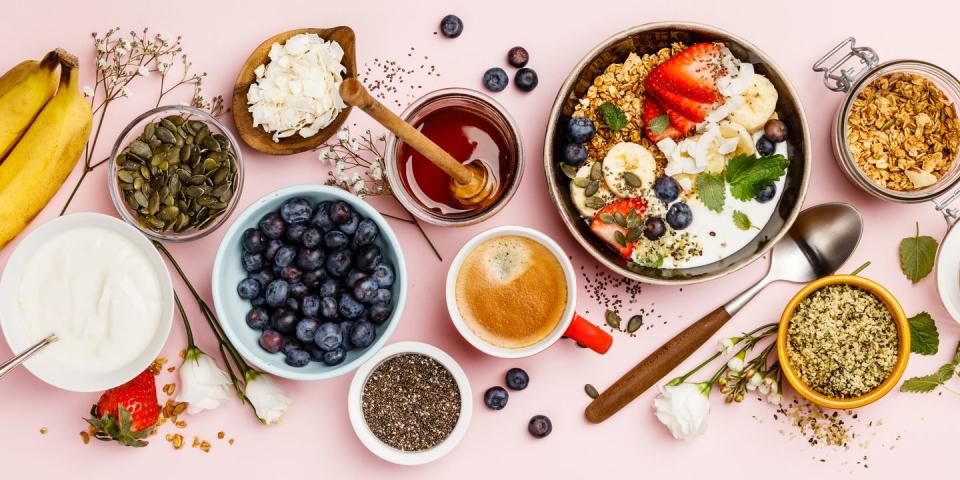Your Digestive System Isn't The Only Thing To Suffer When Your Gut Bacteria Is Out Of Whack

Your stomach is a huge part of your digestive system, and it's directly impacted by the foods that you eat. When it’s not happy, you'll definitely know. Since no one enjoys waking up feeling bloated, it’s no surprise that "best foods for gut health" has become one of the buzziest concepts in nutrition recently—even if you aren’t fully sure what the words "gut health" actually mean.
“Gut health is a pretty vague term, but as it relates to nutrition, it typically refers to the concept of having a balanced gut microbiota, a.k.a. having the right strains of bacteria living in the intestines,” explains Mary Matone, RD, of Culina Health. These bacteria are important for keeping other systems in your body running smoothly. Part of the gut’s job, Matone says, is breaking down fibers and using them to create compounds that help with things like maintain your blood sugar, cholesterol, and appetite.
It stands to reason then when these bacteria go out of whack, you may experience a cascade of effects across several systems in your body. “The balance of bacteria in the gut microbiota may have an impact on everything from digestive health—bloating, gas, and bowel movements—to mental health, and may also be related to chronic disease,” Matone says. A dysregulated gut microbiome may play a part in the development of digestive disorders, such as irritable bowel syndrome (IBS), and may also promote irregular bowel movements, as well as food intolerances, she adds.
Luckily, an easy way to support a healthy gut is through your diet. Here are five types of foods you should add to your diet to keep your gut happy.
1. Foods with Probiotics
There’s a pretty good chance you’ve already heard of probiotics, the “good bacteria” that help keep things moving in your digestive system. These microorganisms play a big role in your gut health, and one of the ways you can make sure you’re maximizing their benefits is by eating probiotic foods, that is, foods that contain the same bacteria that is also in your stomach.
The food people usually associate with probiotics is yogurt, but there are plenty of other great sources. Just make sure to look for that “live and active cultures” phrase on the label.
Here are some examples of foods that are high in probiotics.
2. Foods with Prebiotics
For probiotics, their partner in keeping your gut happy are prebiotics. Prebiotic foods contain fibers that promote the growth of healthy bacteria in the gut, notes Matone, and they help make sure the probiotics in that kombucha you drank don’t get flushed out right away. The two work together to make sure that the microorganisms in your gut are living their best lives.
Foods that are high in prebiotics include the following.
Jerusalem artichokes
Legumes
Oats
Asparagus
Dandelion greens
3. Synbiotic Foods
Synbiotic foods refer to meals that combine probiotics and prebiotics in such a way that gives probiotics the greatest chance of surviving the long digestive trek to the gut itself, according to the Journal of Food Science and Technology. These foods deliver the benefits of probiotics and prebiotics to your stomach at the same time, resulting in one very happy belly.
Try these combos to boost your gut health.
Miso soup with asparagus or other legumes
Yogurt with fruit and oats
Lentil burger topped with kimchi
4. High-fiber Foods
There’s a reason so many people swear by fiber to help them stay regular—it works. It helps keep your digestive system functioning properly, which can help nix issues like bloating and constipation. Fiber also helps slow down your digestion, so you feel fuller longer, an added bonus if you’re trying to lose weight.
All three types of fiber—soluble, insoluble, and fermented—help support your gut in different ways, so make sure you’re getting your fiber from several sources.
You'll find fiber in many of the foods you're probably already eating like the following.
Chia
Bran
Prunes
Brussel sprouts
Beans and lentils
Artichokes
Avocados
Berries
Seaweed
5. Anti-inflammatory Foods
Inflammation is a sign that your body is hard at work repairing itself. But when it comes to your gut, chronic inflammation, which is caused by your body attacking its own healthy cells, can lead to conditions like GI tract issues, IBS, and Crohn’s Disease. Thankfully, there are foods that can help calm inflammation and manage unwanted symptoms.
Add these anti-inflammatory foods to your plate to ease GI discomfort.
Spinach and other leafy green veggies
Salmon
Cruciferous veggies like broccoli, cauliflower, cabbage, and kale
Avocado
Green tea
Olive oil
You Might Also Like

